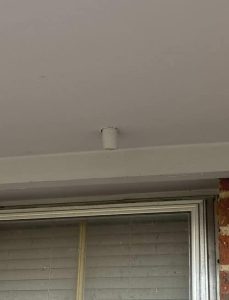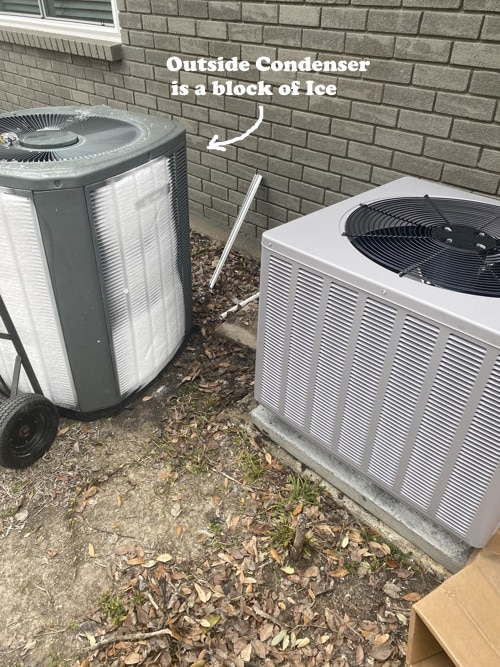Why is my air conditioner leaking water is a common question. So you’ve found your air conditioner leaking water? Here is a check list to help you determine what to do.
- Locate the Source of the Water Leak
- Turn the Air Conditioner Off
- If Water is Leaking Outside the House Go To That Section Below
- If Water is Leaking Inside the House Go To That Section Below
If you need help because your air conditioner is leaking water, try 5 Star HVAC Contractors. For example you can call us for Wylie AC repair or Heath AC repair or any of the following Texas cities: Addison, Allen, Anna, Balch Springs, Bartonville, Carrollton, Coppell, Corinth, Dallas, Denton, Fairview, Farmers Branch, Farmersville, Fate, Flower Mound, Forney, Frisco, Garland, Highland Park, Highland Village, Lake Dallas, Lavon, Lewisville, Little Elm, Lucas, Mckinney, Melissa, Richardson, Rockwall, Rowlett, Royse City, Sachse, Shady Shores, and Sunnyvale, TX.
Air Conditioner Leaking Water Outside the House
The most common place for water to be leaking is the secondary or emergency drain line.
The most likely reason that water is leaking outside the house is that the condensate drain line or primary drain is stopped up. The water will usually be leaking outside coming from a PVC pipe located under the eave of the house.
Most residential air conditioners have part of the system located on the inside of the house and the other part of the air conditioning system located on the outside of the house. This is called a split system.
The part of the air conditioner that is located on the inside of the house will most commonly be found in the attic or a closet.
The evaporator coil and the furnace are located on the inside of the house if you are heating with gas. If you are heating with electricity, you will have an electric air handler that will contain both the evaporator coil and electric heat strips. Let’s take a look at the two areas water will be found outside the house.
Air Conditioner is Leaking Water from the PVC Pipe Outside the House.
 Is your air conditioner leaking water from a PVC pipe on the outside of your house? The image to the right shows a PVC pipe that extends through the soffit of the house. The soffit is also known as the eave of the house. It is the underside of the portion of the roof that extends beyond the walls of the house.
Is your air conditioner leaking water from a PVC pipe on the outside of your house? The image to the right shows a PVC pipe that extends through the soffit of the house. The soffit is also known as the eave of the house. It is the underside of the portion of the roof that extends beyond the walls of the house.
When you see water dripping from this outside PVC pipe, it usually means that the primary drain is stopped up. The PVC pipe where you see water dripping is the emergency or secondary drain. You can attempt to unblock the primary drain yourself or you can contact a plumber or even better an air conditioning technician as the drain was installed by an air conditioning company. The only need for a plumber would be if your main house drain is stopped up.
One of the functions of the air conditioner is to remove humidity from the air. It is humidity that makes you feel sticky and uncomfortable. Humidity is removed from the air when the air passes through the evaporator coil. This cold coil allows for condensation just like when you leave a glass of ice water sitting on a table. Condensation will corm on the outside of the glass.
A house at 75 degrees with low humidity is much more comfortable than a house with high humidity at the same temperature. Removing this humidity is one of the functions of the air conditioner and water is the end result. This water needs to gp somewhere and that somewhere is down the drain. When that primary drain is clogged, the secondary will start dripping water.
Air Conditioner Leaking Water Outside
Why does the Primary Air Conditioner Drain become Clogged?
The primary air conditioning drain becomes clogged for several reasons. One reason is comes from dirt in the air. As the air conditioner removes condensation dust and dirt that passes through the air filter will cling to the condensation that is removed by the evaporator coil. Another reason is algae can grow in the PVC pipe of the primary drain. Yet another reason is some of these air conditioners tie their drain to the bathroom sink. The sink becomes clogged and then so does the air conditioning drain. Also, when the main drain of the house is clogged, then obviously other drains become clogged. If the main drain of the house is stopped up, that is when you call a plumber.
How to Keep the Air Conditioner Drain from being Stopped Up
Many houses never have a problem with the air conditioner drain becoming clogged. Many other houses have a chronic problem. One thing many AC technicians recommend is pouring warm water and vinegar down the AC drain line periodically. This helps reduce mold from growing and also flushes the drain line out. Use a funnel. Another method is to use algae pan pills. Each situation is different and it’s possible that your home will need more than just one treatment in the spring. Go over these things with an air conditioning technician.
Another thing that you should do to eliminate the primary drain from being clogged is to see if it is tied to a sink drain. If it is, you need to keep that sink drain clear. What can happen is that the AC drain is tied to a sink that is rarely used. The sink is constantly fed only dirty water from the air conditioner. Eventually they will clog as no clean water is being run through the drain. Of course the reverse can be true also, if a highly used sink has lots of hair and toothpaste. Bottom line is keep this drain clean and you can eliminate the problem.
Outside AC Conderser Leaking Water

Air Conditioner Leaking Water at the Outside Condenser
If you see a little water around the outside AC unit, is it a concern? A little bit of water around the outside AC condenser can be the result of normal operation. However, you should take the time to inspect the water. First, is it water? Take a close look and make it isn’t air conditioning refrigerant. Air conditioning refrigerant is oily so you can tell it from water. If you determine it is refrigerant call an AC technician immediately. If you have determined it is water, you should definitely look around. As said earlier, a little bit of water can be normal. If there is a lot of water, it could be that your air conditioner is low on refrigerant, or the outside AC condenser coil is extremely dirty.
If you can see the condenser coils are packed with dirt and grass, you should probably call for an air conditioning technician. Yes, you can clean it yourself if you know what you are doing. However, you shouldn’t. Under no circumstances should you power wash your air conditioner. You will surely damage the coils and most likely will need a completely new condenser. If the air conditioner is extremely dirty it will need to be chemically cleaned. You should let a professional clean the condenser. When he has completed the job ask him to show you how to keep the coils washed so they will never get in this condition again. Once they are clean, the technician can show you how to keep them clean without damage to the coils.
If you see a lot of water around your outside condenser it is likely freezing up and then thawing out leave a pool of water. Look at the image next to this and you will see a condenser that is completely frozen up. Once a condenser becomes frozen like that, if you didn’t have a refrigerant leak before you likely will have soon. Bottom line is keep the condenser coils clean so that the system will run efficiently.
Air Conditioner Leaking Water Inside the House
Water Leak Ceiling
Have you noticed water on your ceiling? Do you suspect that it is coming from an air conditioner? Here are a few things you should consider if you have water on your ceiling.
Water Leaking from the Roof
Have you had a new roof installed recently? Has it rained? The problem could be coming from your roof. Even if you suspect the water leak is from the air conditioner, the leak could be coming from a vent pipe that goes through the roof. If you have had a new roof and it has recently rained, this needs checked.
Water Leaking from Plumbing
Do you have bathrooms or plumbing above the ceiling that shows evicence of a water leak? Remember with both a roof and plumbing leak water can travel down a pipe or board and leak far beyond the source of the problem. Any area where there is plumbing is a potential source of the water leak.
Water Leaking from the Air Conditioner
Do you have water leaking on your ceiling? With all the improvements of air conditioning you shouldn’t have water leaking from you air conditioner. Certainly, it can happen, it just shouldn’t. A properly installed air conditioner should not leak on your ceiling. If you have a ceiling leak, your AC system might not be installed properly.
The air conditioner removes water from the air as it passed through the evaporator coil. The water condenses on the cold coil as the air conditioner removes heat from your home. Part of the job of the air conditioner is to remove water from the air as water holds heat. A humid home feels sticky and is less comfortable in the summer than a home that is less humid. As the air conditioner runs and removes humidity, this water has to go somewhere. The optimal place is down the drain. So, the water from the evaporator coil is sent down the drain.
What happens if the drain becomes clogged? One thing that can happen is the air conditioner can shut off. This will only happen if a safety float switch is put in the drain line at installation. Another thing that can happen is the primary drain line will back up and the water is sent to an emergency drain pan. The emergency drain pan is hung underneath the system. If water is sent to this pan, it should end up dripping out the soffit of your home from a PVC pipe. See the above section about water leaking outside the house.
There can also be a safety float switch installed in the emergency drain pan that will shut the system off if the emergency drain line becomes clogged. Sometimes mud daubers can clog the emergency drain line by building a nest in it. That is something that should be checked if your drain pan ends up full of water and is not draining.
Another thing that can happen is if the primary drain pan becomes cracked or broken , it can send water straight to the emergency drain pan. This doesn’t happen often but is a consideration as most pans are now made of some form of plastic.
In conclusion, if your air conditioner is properly installed, the chances of a ceiling leak are greatly reduced. Ceiling leaks were much more common years ago before all the improvements were made. However, always remember it needs to be being properly installed and properly maintained.
Air conditioner is Leaking Water from a Closet
If you see water leaking from a closet it will be coming from an air conditioner or a water heater. If you know the air conditioner is located in the closet that water is coming from it likely means the primary drain line is clogged. Many companies will install a safety float switch that will shut the air conditioner off if the drain becomes clogged.
The advantages of having an air conditioner in the closet as opposed to the attic is that the air conditioning filters are much easier to change. Also, if the air conditioner is in the closet it is not exposed to attic heat so it will run cooler. The advantages to having the air conditioner in the attic is that you gain a closet or additional usable square footage. Also, the system can be installed with an emergency drain pan underneath it which will allow the condensation to be drained outside if the primary drain becomes clogged.
Do You Have an Air Conditioner Water Leak in One of These Cities?
If you have an air conditioner water leak in one of the following cities, we can help. Addison, Allen, Anna, Balch Springs, Bartonville, Carrollton, Coppell, Corinth, Dallas, Denton, Fairview, Farmers Branch, Fate, Flower Mound, Forney, Frisco, Garland, Heath, Highland Park, Highland Village, Lake Dallas, Lavon, Lewisville, Little Elm, Lucas, McKinney, Melisa, Mesquite, Murphy, Nevada, Plano, Prosper, Richardson, Rockwall, Rowlett, Royse City, Sachse, Shady Shores, Sunnyvale and Wylie. If your air conditioner leaks water in the Dallas Metro area, call 5 Star HVAC.

